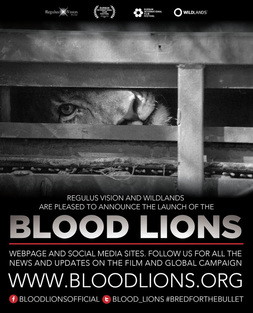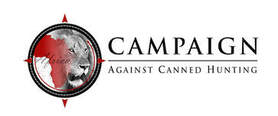
review by Simon Bloch
The long awaited release of the film Blood Lions doesn't just blow the lid off claims made by the predator breeding and canned lion-hunting industries - it convincingly torpedoes them and debunks the myths one step at a time.
So revealing and honest is this film, I can guarantee it's already rattling cages and opening closets full of skeletons,as far away as Dallas and Reno, Shanghai and Little Saigon.
The premiere screening at the Durban International Film Festival last night more than lived up to the hype, where it played to a packed house, and received a standing ovation.
A factual and brutally hard-hitting documentary filmed in HD, Blood Lions exposes South Africa's “dirty little secret”, to a wider global audience via the big screen..
The pre-publicity and social media campaign around the movie has made Blood Lions the most talked about conversation on Facebook and twitter – a much larger public now being aware of the con in conservation, and the trade in skin, bones, blood and money.
There are approximately 6000 captive lions on about 200 properties, government figures.
The fair-chase principal does not exist on a canned-hunt. The outcome is guaranteed.
A canned hunt is where the target animal is unfairly prevented from escaping the hunter, either by physical constraints, such as fencing, or by mental constraints, such as being habituated to humans, according to Chris Mercer, director of the Campaign Against Canned Hunting (CACH).
Canned lion-hunt operators also draw on deception and other bags of tricks to guarantee the kill for wealthy clients.
Hunting videos show how predators are lured into the hunters' sights by bait-carcasses left hanging from trees. Or purposely-dropped pools of animal blood meant to attract the semi-tame cats within shooting range.
This is highly-charged and explosive proof of the psychopathic persecution of wildlife.
The film's highly-charged and explosive proof of the psychopathic persecution of lions led executive producer Dr Andre Venter, to say after the screening:
"This film comes as a call for action, and as a voice for the voiceless, We are part of the global movement that wants to put a stop to this abhorrent behaviour".
The clear narrative and visuals from the documentary cast a dark shadow over South Africa's environmental track-record and conservation ethos, leaving viewers asking how 21st century civilization has allowed such barbaric practices to flourish untouched for so long - and clearly conveys a message to the South African authorities, from millions of people around the world who have for years been shouting:
"Shut them down and close the door".
Blood Lions identifies a sleazy industry, largely concealed from the public's prying eyes, and well-protected from outside inflitrators or "greenies".
For Michler, "part of the narrative behind canned lions is brutality. I certainly believe this is a continuation of the story of South Africa's brutal past".
Senior provincial nature conservation official Werner Boing admits on camera:
"It's time we started to be honest with ourselves".
Derek Hanekom, Minister of Tourism, even adds:
My feeling is I'm not proud of it. The industry has certainly damaged Brand South Africa."
Also interviewed is Botswana's Environment minister, Tshekedi Khama, who says:
"We don't get second chances".
Captive bred lions are human imprinted, bred with suspect, or inferior genes compared to the wild predators that have no equal. They can never be released to the wild, and therefore play no role in conserving the wild population.
The South Africa government owns the problem, "lock- stock and barrel", having failed to stand up to powerful wildlife industry lobby groups, its own poor regulatory controls and the continually mis-construed definition of the term "sustainable use".
Blood Lions argues that "sustainable use" been hi-jacked by BIG MONEY and the powerful hunting and pseudo- science research communities to suit their own agendae. Lawyers, guns and money have turned the reference term on its head, so that it becomes "legally sustainable abuse".
The film covers the unnatural cycle of life of canned lions, from the cradle to the grave, from the time they are hand-reared as two or three day-old cubs by overseas volunteers, to the day they are shot or wounded by foreign hunters, who often have no shooting and hunting skill, but spend thousands for the thrill of the kill. There is gut-wrenching footage of wounded predators unable to move. Sometimes the mercy or kill-shot shot will take minutes, or hours to arrive.
At the centre of it all is the Big Con in Conservation, where thousands of international gap-year students pay millions to breeding-farm operators for opportunities to work with the lions and cubs, 'con'-vinced they will be playing important roles in conserving the species.
They bottle-feed cubs at supposed "sanctuaries", which are nothing more than battery farms and tourist traps. In essence, unscrupulous breeders and preying tourism-agents lure them into the traps by exploiting their weak naivety and compassion for animal welfare.
The dark under-belly of the beast is dissected and laid-bare in this well-crafted film, when an American named Rick travels to hunting farms in search of a canned hunt.
There are tense moments and candid, life threatening dramas involving stand-offs with hunting operators and members of the so-called Afrikaner "predator mafia", which reminded me of the film Deliverance.
Caught off-guard by paranoid canned hunters, the film crew were forced on more than one occasion to beat hasty retreats, or possibly "be fed to the lions", after they were outed as "undercover spies”.
It's a multi-million dollar industry and Blood Lions joins all the dots in the canned lion saga - bred for the bullet or bones at breeding farms and volunteer traps of the Free State to the heart of the Safari Club International organisation and its annual hunt-marketing shows in Reno,and back again to the canned-hunting farms of Limpopo, the North West and the Eastern Cape.
An industry that trades off nothing but a myth - African lions, the majestic king of all wild beasts, reduced to nothing but walking target-practice - bred for the bullet, and skinned for a trophy.
Furthermore, the film also explains how the canned-lion farmers pose a major threat to the last remaining wild lion populations left in Africa, with wild lions now being poached for the financial incentives.
The lion bone trade started on hunting farms, and is a flourishing business, being sold to taxidermists who export them to Asian traders for mixing in expensive tonic wines as a replacement for tiger bones.
There are more than 1000 canned-lion hunts every year.
Lion skeletons can fetch up to R18000, but the South African government allows the trade, again under the blanket of" sustainable use of natural resources".
Tigers however, are listed on the IUCN’s red-list as a "most critically endangered" species, and although they may not be hunted in Asia, they are bred in captivity in China, Thailand and Vietnam specifically for the harvesting of their body parts.
Also questionable is why tiger hunting on private farms in South Africa is legal.
Classified in South Africa as an exotic species, since they are not indigenous to the continent, there have been claims that tiger bones are hidden in shipments of lion bones exported to Laos and Vietnam.
Word is that North West Province is cleaning up after was struck by an earthquake today, and the hunting community are running for cover, scrambling to control the damage.
Reportedly, conservation department officials are already close to being suicidal!
The after-shock and tremors were also felt by the SCI hunting brotherhood (and a few of their sisters - hello Kendall, hi Melissa) are hanging their heads in shame, asking the world to forgive them.
Kudos to the Blood Lions crew led by producer Pippa Hankinson, conservation journalist and investigator Ian Michler, camerman/director Nick Chevalier, and executive producer Andrew Venter of Wildlands, for their brave endeavor in making this film,
